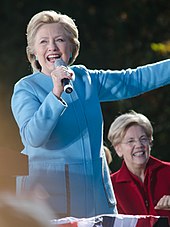2016 presidential campaign

On April 12, 2015, Clinton formally announced her candidacy for the presidency in the 2016 election. She had a campaign-in-waiting already in place, including a large donor network, experienced operatives and the Ready for Hillary and Priorities USA Action political action committees and other infrastructure. Prior to her campaign, Clinton had claimed in an interview on NDTV in May 2012 that she would not seek the presidency again, but later wrote in her 2014 autobiography Hard Choices that she had not decided. The campaign's headquarters were established in the New York City borough of Brooklyn. Her campaign focused on: raising middle class incomes, establishing universal preschool, making college more affordable and improving the Affordable Care Act. Initially considered a prohibitive favorite to win the Democratic nomination, Clinton faced an unexpectedly strong challenge from democratic socialist Senator Bernie Sanders of Vermont. His longtime stance against the influence of corporations and the wealthy in American politics resonated with a dissatisfied citizenry troubled by the effects of income inequality in the U.S. and contrasted with Clinton's Wall Street ties.
In the initial contest of the primaries season, Clinton only very narrowly won the Iowa Democratic caucuses, held February 1, over an increasingly popular Sanders— the first woman to win them. In the first primary, held in New Hampshire on February 9, she lost to Sanders by a wide margin. Sanders was an increasing threat in the next contest, the Nevada caucuses on February 20, but Clinton managed a five-percentage-point win, aided by final-days campaigning among casino workers. Clinton followed that with a lopsided victory in the South Carolina primary on February 27. These two victories stabilized her campaign and showed an avoidance of the management turmoil that harmed her 2008 effort.
On March 1 Super Tuesday, Clinton won seven of eleven contests, including a string of dominating victories across the South buoyed, as in South Carolina, by African-American voters. She opened up a significant lead in pledged delegates over Sanders. She maintained this delegate lead across subsequent contests during the primary season, with a consistent pattern throughout. Sanders did better among younger, whiter, more rural and more liberal voters and states that held caucuses or where eligibility was open to independents. Clinton did better among older, black and Hispanic voter populations, and in states that held primaries or where eligibility was restricted to registered Democrats.
By June 5, 2016, she had earned enough pledged delegates and supportive superdelegates for the media to consider her the presumptive nominee. On June 7, after winning most of the states in the final major round of primaries, Clinton held a victory rally in Brooklyn becoming the first woman to claim the status of presumptive nominee for a major American political party. By campaign's end, Clinton had won 2,219 pledged delegates to Sanders' 1,832; with an estimated 594 superdelegates compared to Sanders' 47. She received almost 17 million votes during the nominating process, as opposed to Sanders' 13 million.
Clinton was formally nominated at the 2016 Democratic National Convention in Philadelphia on July 26, 2016, becoming the first woman to be nominated for president by a major U.S. political party. Her choice of vice presidential running mate, Senator Tim Kaine, was nominated by the convention the following day. Her opponents in the general election included Republican Donald Trump, Libertarian Gary Johnson and Jill Stein of the Green Party. Around the time of the convention, WikiLeaks released emails that suggested the DNC and the Clinton campaign tilted the primary in Clinton's favor.
Clinton held a significant lead in national polls over Trump throughout most of 2016. In early July, Trump and Clinton were tied in major polls following the FBI's conclusion of its investigation into her emails. FBI Director James Comey concluded Clinton had been "extremely careless" in her handling of classified government material. In late July, Trump gained his first lead over Clinton in major polls following a three to four percentage point convention bounce at the Republican National Convention. This was in line with the average bounce in conventions since 2004, although it was toward the low side by historical standards. Following Clinton's seven percentage point convention bounce at the Democratic National Convention, she regained a significant lead in national polls at the start of August. In fall 2016, Clinton and Tim Kaine published Stronger Together, which outlined their vision for the United States.
Clinton was defeated by Donald Trump in the November 8, 2016, presidential election. By the early morning hours of November 9, Trump had received 279 projected electoral college votes, with 270 needed to win; media sources proclaimed him the winner. Clinton then phoned Trump to concede and to congratulate him on his victory, whereupon Trump gave his victory speech. The next morning Clinton made a public concession speech in which she acknowledged the pain of her loss, but called on her supporters to accept Trump as their next president, saying: "We owe him an open mind and a chance to lead." Though Clinton lost the election by capturing only 232 electoral votes to Trump's 306, she won the popular vote by more than 2.8 million votes, or 2.1% of the voter base. She is the fifth presidential candidate in U.S. history to win the popular vote but lose the election.o She won the most votes of any candidate who did not take office and the third-most votes of any candidate in history, though she did not have the greatest percentage win of a losing candidate. (Andrew Jackson won the popular vote by 10.4% but lost to John Quincy Adams).
On December 19, 2016, when electors formally voted, Clinton lost five of her initial 232 votes due to faithless electors, with three of her Washington votes being cast instead for Colin Powell, one being cast for Faith Spotted Eagle, and one in Hawaii being cast for Bernie Sanders.
Comments
Post a Comment